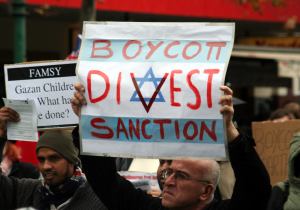Putting Anti-Semitism in Context
 For residents of Gaza, Operation Protective Edge was a harrowing experience. Thousands of Palestinians were maimed or killed by Israeli air and missile strikes that continued to rain on city squares throughout July, even targeting civilians in hospitals and schools. Outraged by Israel’s indiscriminate bombing of Palestine, civilians across the world have reacted, but an alarming portion of their reactions have not been in anyway desirable.
For residents of Gaza, Operation Protective Edge was a harrowing experience. Thousands of Palestinians were maimed or killed by Israeli air and missile strikes that continued to rain on city squares throughout July, even targeting civilians in hospitals and schools. Outraged by Israel’s indiscriminate bombing of Palestine, civilians across the world have reacted, but an alarming portion of their reactions have not been in anyway desirable.
The ugly face of anti-Semitism has resurfaced as the world continues to assume that it has learned from the past to never wrong the Jews again. Hate crimes directed at the Jews have grown exponentially in Europe. While protesting against Israeli policy, pro-Palestinian rallies in Belgium and France demonstrated for “Death to the Jews” and in Germany, to “Gas the Jews”. In Brussels, Belgium, four people were murdered in a Jewish museum and in Wuppertal, Germany, a synagogue was firebombed; some Jews were reportedly beaten with iron pipes.
Observing the resurgence of anti-Semitism, Chancellor Angela Merkel of Germany implored the violent mob to exercise restraint. She has officially stated that “Jewish life is part of us, of our identity and culture,” insisting that “it is our national and civic duty to fight anti-Semitism.” Secretary-General of the United Nations, Ban Ki-Moon also bemoaned anti-Semitic attacks in Europe, emphasizing that “the conflict in the Middle East must not constitute a pretext for prejudice that could affect social peace and harmony anywhere.”
According to the survey (53,100 adults in 102 countries) conducted by Anti-Defamation League (ADL) this year, 26 percent of people surveyed were affected by anti-Semitism. Regionally, Eastern Europe (34%) was ranked the highest in anti-Semitic sentiments, followed by Western Europe (24%), Sub-Saharan Africa (23%), Asia (22%), the Americas (19%), and Oceania (14%). The country/territory with the most anti-Semitism was West Bank and Gaza, at 93 percent, and the least was Laos at 0.2 percent.
This survey provided two interesting insights. First, the portion of a population that is anti-semitic, and the number of critical anti-Semitic movements are not positively correlated. Extreme, large-scale anti-Semitic movements have been recurring not in Eastern Europe, which ranks highest in anti-Semitic feeling, but in Western Europe which ranked second highest. In addition, the figure in Asia of people who hold anti-Semitic views is not very different from that in Western Europe. This is alarming because the world has rarely perceived an anti-Semitic movement taking place in Asia. Fortunately, such movements seem unlikely to take place in the near future.
Asia may be less prone to address this problem because they do not regularly come in contact with Jewish people, and also because Asia sees no direct security threat involving the Jewish state, Israel. For one, Asians rarely meet Jewish people in their lifetime unless they go abroad. We could assume that Asia’s anti-semitism comes from perceptions molded by the portrayal of Jews in literature or mass media. What’s more, conflicts associated with Israel is of less importance in contrast to the imminent regional security issues of Asia, such as ethnic minority movements in China and island disputes between Asian nations. Nevertheless, the considerable existence of anti-semitic sentiments - the basis for hate crimes and persecutions against the Jews for centuries - is a cause for concern.
Twenty-first century anti-Semitism differs from its counterpart in the past century. While anti-Semitism in the twentieth century targeted an ethnicity – the Jews – anti-Semitism today has been directed more against the state of Israel. Still, since Israel was established by the Jews, anti-Israel sentiments naturally leads to anti-semitism. To an extent, the distinction between anti-Semites and those against the state of Israel has been blurred. Anti-Semitism, therefore, must be viewed through a different lens.
For much of the past century, the treatment of Jews has been an indicator of the degree of ethnic tolerance in Europe. However, as anti-Semitism targets Israel as a state more than it targets Jews as an ethnic group, anti-Semitism should be interpreted in the context of international political dynamics, not in the context of domestic prejudices. World leaders ought to consider opinions that arise due to these anti-Semitic movements. Radical opinions may not represent public opinion, but extremist movements do not emerge out of the blue. There is always a cause before an effect. It is therefore the responsibility of international leaders to scrutinize and reevaluate the cause of anti-Semitism in Europe to secure domestic stability and international peace.
